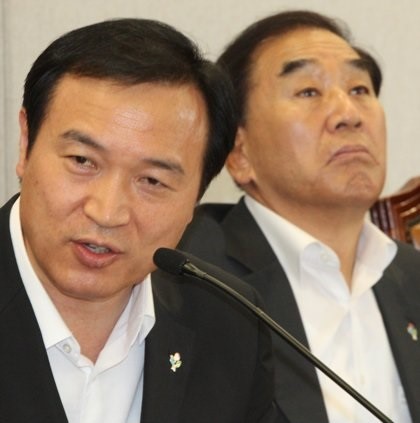- California Assembly OKs highest minimum wage in nation
- S. Korea unveils first graphic cigarette warnings
- US joins with South Korea, Japan in bid to deter North Korea
- LPGA golfer Chun In-gee finally back in action
- S. Korea won’t be top seed in final World Cup qualification round
- US men’s soccer misses 2nd straight Olympics
- US back on track in qualifying with 4-0 win over Guatemala
- High-intensity workout injuries spawn cottage industry
- CDC expands range of Zika mosquitoes into parts of Northeast
- Who knew? ‘The Walking Dead’ is helping families connect
S. Korean political heavyweights moving to run as independents

Yim Tae-hee, left, served as the chief of staff to former President Lee Myung-bak, and Lee Jae-oh used to be the party’s floor leader and considered to be one of the closest confidants of former President Lee, but they were both left out of the nomination process by the ruling party this week. (Yonhap)
SEOUL (Yonhap) — Several political heavyweights announced Wednesday that they could run in next month’s parliamentary election by either becoming independents or joining other parties amid a growing feud over the nomination process.
Earlier this week, the ruling Saenuri Party and the main opposition Minjoo Party of Korea almost wrapped up the selection of candidates who will run in the April 13 general elections.
On Tuesday, the Saenuri’s election nomination committee announced the candidates that will receive party tickets, but excluded several high-profile politicians such as Yim Tae-hee, a former two-term lawmaker.
Yim, who also served as the chief of staff to former President Lee Myung-bak, said he will win as an independent, as he could not accept the party’s decision to exclude him from consideration.
Rep. Lee Jae-oh, a five-term lawmaker and considered to be an opponent of the pro-Park Geun-hye faction within the party, also failed to receive the party ticket.
Rep. Lee previously served as the party’s floor leader and is considered one of the closest confidants of former President Lee.
The ruling party still has not finalized whether to nominate the party’s former floor leader Yoo Seong-min.
Yoo stepped down from his post in July 2015 after President Park publicly lambasted him for leading negotiations with the main opposition party on the passage of a parliamentary revision bill.
Political analysts forecast that if Lee Jae-oh creates some kind of coalition with other heavyweight dropouts, this could pose problems for the ruling camp, particularly in heavily contested districts in Seoul and the surrounding Gyeonggi region.
Meanwhile, Rep. Chyung Ho-joon, who had failed to receive the Minjoo Party’s ticket, joined the minor People’s Party on Wednesday.
Chyung’s move allows the People’s Party to form a parliamentary negotiation bloc by having 20 seats in the 300-strong National Assembly.
The Minjoo Party of Korea excluded Chyung and other veteran politicians, including former Prime Minister Lee Hae-chan, who also declared his intent to run as an independent.
Chyung is a son of Chyung Da-chul, a former adviser to the Minjoo Party. The senior Chyung had said he would persuade his son to join the minor People’s Party and would join it as well.
Rep. Jung Chung-rai, who was also excluded from the nomination last week, meanwhile, said he will respect the party nomination committee’s decision.
“I am willing to do anything for the party’s victory,” Jung told reporters, noting that he will not take further action.
Rival parties have virtually picked most of the candidates who will run for the 253 parliamentary seats to be chosen through direct elections. The remaining 47 are proportional representation seats that will be allocated to parties according to the numbers of votes they receive overall.















